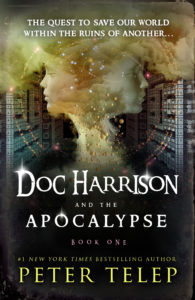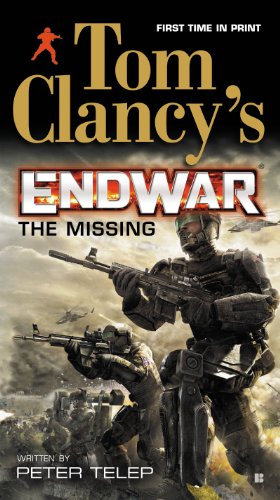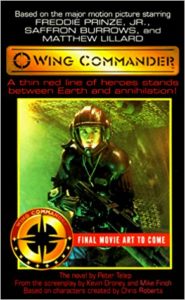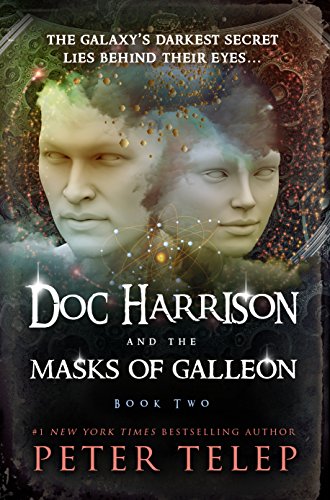Peter Telep interview
A past contributor to the Tom Clancy and Wing Commander universes, Peter Telep has been in the industry an long time. In this exclusive interview he tells us about his latest books, and childhood influences.
Can you tell us about your latest series?
Doc Harrison follows the adventures of a high school kid from Florida who wakes up on a post-apocalyptic alien planet, only to discover he was born there and the planet was destroyed by his own father. The place is still swarming with exotic creatures, caravans of sick kids called “rumms,” and a radical force of ex-military “nomads” planning to take over the last known sanctuary called The Palladium.
Doc is there with his lifelong friend Julie and his surrogate Uncle Tommy (a forty year old Marine Corps officer and friend of his father’s).
As the story unfolds, Doc and Julie learn they’re not exactly human. They have an extra organ in their bodies called a “wreath” that allows them to project their “personas,” which are second glowing version of themselves (not a ghost but a very real avatar). At first, Doc and Julie can’t control how their personas look. Doc is a musclehead: a representation of his ego. Julie is a heavyset girl with pimples, glasses, and greasy hair: a representation of her insecurities. Also, it takes practice to “multitask” and be in your body and your persona at the same time, plus you can only project your persona for four hours before it starts draining your body. You can teleport around the planet in your persona and use it to share memories, but if you get lost, you can die. And, of course, people aren’t the only ones with personas… some creatures have as many as six.
As Doc and Julie come to terms with these mind-blowing revelations, they’re caught up in a massive attack on the Palladium. They need to escape and find a way back to Earth so they can stop the man who abducted Doc’s father… and save more than just one planet… because four worlds hang in the balance.
The series goes on to explore the histories and destinies these worlds across three novels, and I’ve really had a fantastic time creating them, their inhabitants, and linking all of them to two of the most dysfunctional families in the universe.
When I began this project, I really wanted to write stories my daughters would actually read (they’re eighteen and twenty-two). I also love coming of age tales because I believe we are all, throughout our entire lives, coming of age.
How did your collaboration with Tom Clancy come about?
I began my career by writing fantasy novels and science fiction media tie-in books. I wrote a lot of military science fiction as well. Right after 9/11, my editors were intent on me writing more realistic military fiction (the hunt for terrorists). I wrote three different series of novels for various publishing companies, including work for Tom Clancy’s editor. He called and asked if I’d like to collaborate with Mr. Clancy… and the rest is history!
Did you read much science fiction and/or fantasy as a kid? How did those writers influence your work?
My father was a big science fiction fan, especially the movies, so I was constantly going to see films like Rollerball, Westworld, Logan’s Run, and the Planet of the Apes series. We also watched Star Trek, The Twilight Zone, and The Outer Limits on television. When I was in third grade, I wrote an original Planet of the Apes story that my teacher had bound and put on the bookshelf next to the other “real” books. That obviously made a big impression on me! I remember after seeing Star Wars that I picked up the novelization (credited to George Lucas but written by Alan Dean Foster), and that inspired me to begin reading a lot of classic science fiction stories and novels. My favorite authors from that generation are Ray Bradbury, Isaac Asimov, Arthur C. Clarke, Harlan Ellison, Ursula K. Le Guin, Frank Herbert, and many more. I’m a huge George R.R. Martin fan and truly love the work of author Joe Haldeman. I became friends with the late Joel Rosenberg, whose Guardians of the Flame fantasy series really spoke to me. Neal Stephenson’s Snowcrash inspired me to write my master’s thesis in college. That book is sardonic and hilarious.
Anyway, while I was reading these stories and novels, I kept a notebook and pen at my side. I would make journal entries about cool scenes or clever lines or some description I thought was really fantastic. I was trying to make those pages infectious. I wanted the author’s talent to rub off on me! Later on, I would try to mimic those elements in my own work, and I discovered that this journaling made that process much easier. Of course, I’m not talking about plagiarism but perhaps using the same technique of describing a character. For example, instead of always focusing on the visual, why not begin with the ole factory and describe how a character smells to others in the scene and use those various odors to form a complete description. That’s a less clichéd way to go about things and might prove more memorable for the reader.
Tell us about your working style. Do you research extensively?
Given my background and experiences with the Clancy empire, I’ve done a ton of research over the years. I’ve received real military training from Force Recon Marines and Navy SEALs. I’ve been up to the Sig Sauer Academy in New Hampshire and fired many of their weapons. I’ve piloted a riverine patrol boat. As you might expect, I’ve taken that commit to research and applied it to my recent work, and while I can’t go out and interview an extraterrestrial in the field, I can consider the complexity of the worlds, their cultures, and the influence of technology on them.
It’s true, though, that my new series could be classified as science-fantasy. There is some mention of particle physics and entangled particles, but it’s nothing too heady, given my broad audience. In future novels I’m sure I’ll push the envelope on this and illustrate ways in which the harder science profoundly affects the characters.
I was excited to learn you had written some books based on the classic game Wing Commander. Can you tell us about those?
When creator Chris Roberts announced that he was making a Wing Commander film, I was brought in to novelize his script. The first thing I did was contact fans at the Wing Commander Combat Information Center (http://www.wcnews.com) and let them know about the project. I asked for help! Why not have the fans assist you in writing the best adaptation you can? I worked with Ben Lesnick and many others to learn more about the history of the Wing Commander games and universe, and I was able to use that rich backstory in my novel. Many, many fans have told me that the book is great because I respected the universe. I always say you have yourselves to thank for that! I went on to do two more original novels in that series, and again, I received their help. It’s been a great honor to be linked to that franchise and to have contributed a small part.
What are your future projects?
In addition to teaching fiction writing, script writing, and writing for video games classes at the University of Central Florida, I’ll continue working on more novels in my new series. I’m already planning the fourth novel: Doc Harrison and the Secret Persona. I could probably write a dozen of these books because I love this universe so much. When you’re having fun, you never run out of ideas, and it never seems like work!
What advice do you have for aspiring writers?
A writer is a reader. Read everything. Take notes. Pay attention to form, style, characterization, plot. Take more notes. And then write a first draft quickly. Get it out. Take all the risks. Zero draft. Vomit. Who cares? Then, once you have a draft in hand, the real story will begin to take shape. Write short stories first to learn your craft, and then work on the novels. You will learn how to tell a story concisely by practicing with shorter forms. Too many novices write long-winded material (books that really begin in chapter three). You don’t have that luxury when writing short fiction, so that is your training ground.
Nowadays, a great cover and blurb can sell a book, but the real secret to maintaining an audience is to have the chops: the ability to write clever and engaging material that keeps them coming back for more.
And when you get discouraged, just remember the service you’re doing as a storyteller. Maybe one day your little story will help someone feel better because you’ve gifted them with your imagination and, perhaps, allowed them to experience some real joy in the world. Storytelling is a powerful and rejuvenating medium, and having just one reader still makes it a worthwhile endeavor.
Thanks for having me here at SF-books.com. It’s been my pleasure.
https://www.goodreads.com/author/show/563405.Peter_Telep
https://www.facebook.com/authorpetertelep/
https://twitter.com/petertelep






